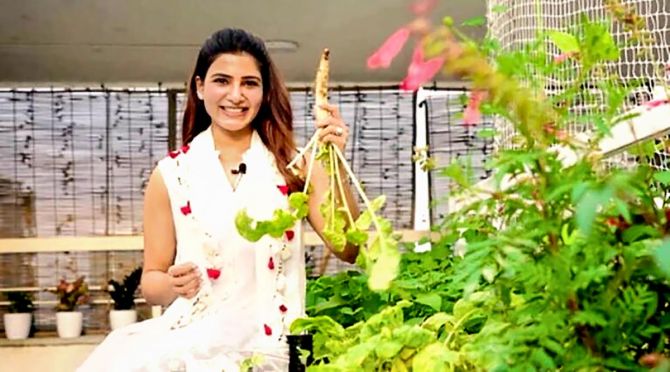From ensuring no amount of food is wasted to composting kitchen waste for use in the garden, even donating or up-cycling hoarded items like old clothes etc became a norm, says mompreneur Anamika Sengupta.

Even as governments, communities and families continue to fight the pandemic and come to terms with a new normal, the COVID-19 outbreak and the resultant lockdown has completely disrupted our 'normal' way of living and working.
From businesses, healthcare, education, banking and entertainment to service sectors like hospitality and travel, have drastically being impacted, bringing the global economy to a slowdown, forcing us to reflect and re-evaluate our old habits and perceptions.
From hyper-consumerism to shopping for essentials, and from fast paced business travel to discovering work from home/remote desktop, we have been forced to look and adopt newer alternatives, which have surprisingly been good on the health of the individual and the planet.
With less disposable income in hand, perceived scarcity, little to no external help due to the lockdown and a full house almost 24x7, are other factors that have created the ecosystem for a self-reliant and simpler way of healthy living.
Here are five off the grid lifestyle lessons we learnt when COVID-19 struck at home:
1. Grow your own food
With hours of time at hand, thanks to the lockdown, gardening, among other hobbies, began gaining popularity at the beginning of the lockdown.
However, difficulty accessing essentials, which were also sold at high prices and the seemingly war footing efforts needed to step out every time to purchase these, drove many of us to grow our own small or big vegetable garden or planting herb pots.
It also helped us realise the simple pleasures of homegrown organic veggies which are much more beneficial to our health and tasted way better than the ones bought at the supermarkets!
Even as lockdown eases, most of us continue to tend lovingly to our kitchen gardens, even adding new herbs and veggies to the list!
2. Minimise waste
The jarring picture of the underprivileged, labourers and daily wage earners who were among the worst affected segment of society, facing starvation and poverty, suddenly made us acutely aware of our privileges.
While various organisations and individuals came forward to donate and feed the needy, a lot of us staying at home felt the need to contribute by simply practicing mindful consumption patterns and avoid wastage.
From ensuring no amount of food, either cooked or raw, is wasted to learning the basics of zero waste lifestyle, composting kitchen waste for use in the garden, to donating or up-cycling hoarded items like old clothes etc, became a norm.
3. Conscious consumerism
They say old habits die hard, but the lockdown has made us sit up and take stock of our toxic and sometimes mindless consumption habits.
As international trade took a backseat and the national economy demanded a focus on Made in India goods and solutions, a new method of conscious consumerism, led by the 'vocal for local' businesses, gained momentum.
Apart from shopping at local, smaller businesses, there was a shift in the what, how, when and where we shopped, the quality and the health impact of the products etc, became crucial differentiating factors.
4. Inclination to natural alternatives
Even as we became aware about the health impact of the food we consumed, a slow but steady realisation about environmental impact, climate change and the curiosity about alternative, earth friendly life choices also began.
This also led to an increased preference for natural or chemical-free and eco-friendly solutions that were also budget friendly.
What started as a search for home-made, natural immunity boosters, soon became a disruptive lifestyle transformation trend. From beauty and grooming products, learning to make DIY home cleaners, bio-enzymes to natural dyes for organic fabric etc., became popular.
5. Back to basics
During the pandemic, it seemed like many Indians time travelled a few decades back, where people hardly could afford domestic help and when the onus of doing each and every household chore completely fell on their shoulders.
When we went back to basics by completely managing cooking and cleaning on our own, it gave us insights into changes that could be made for a healthier living.
From the products used in the kitchen, bathroom or house in general to the cleaning schedules, methods of cooking using economical use of fuel to cooking healthier meals, we realised the importance of simpler ways, going back to the basics.
Until a few months ago, hyper consumerism had created a huge waste from one time use products. But now we are learning to reuse and recycle. Economic, conscious and basic lifestyle choices have become cool again!
Apart from the above, we also became aware that with a bulk of human population stuck indoors, the environment, the water bodies started looking cleaner, streets stayed clear of tons of plastic take away boxes, cups etc, and air became purer giving the glimpses of nature like never before.
An epiphany of sorts struck that now is time to understand that collective efforts can bring a real change, therefore these habits formed during lockdown when actually adapted permanently in life, can help many people around the world to adopt environment friendly practices to lead a healthier and happier life!
Anamika Sengupta, founder of Almitra Sustainables is a TedX speaker who encourages people switch to a more sustainable lifestyle.











